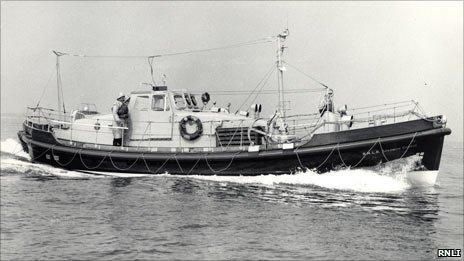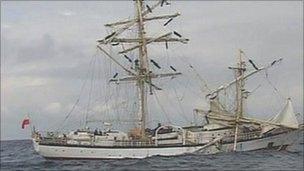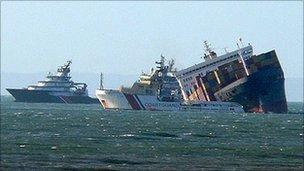Falmouth Coastguard's famous overnight rescues
- Published

The Penlee crew of the Solomon Browne lifeboat died trying to rescue a stricken ship days before Christmas in 1981
Falmouth Coastguard will no longer provide 24-hour cover for maritime emergencies.
Following an announcement by the government it will, instead, become a "sub-centre" operating during daylight hours only.
If the decision is rubber-stamped after a 14-week consultation, Falmouth's international remit - which covers 660,000 sq miles of the Atlantic - will be handed over to the Maritime and Coastguard Agency station on the Solent.
Throughout the maritime world, both professional and leisure sailors have reason to be grateful to the men and women of Falmouth Coastguard.
South West yachtsman Alex Bennett said it was a sad day and described the government's decision as "borderline madness".
"It's potentially terrible news for anyone who uses the waters around our amazing coast," the Torquay sailor told BBC News.
"Our coastguards do a fantastic, professional job and it's because they have that local knowledge.
"They know the waters and how the weather affects them and that's why they are able to act decisively to save lives.
"The South West has a fantastic coastline which draws thousands of holidaymakers every year and to take away the local knowledge and service of our coastguards is crazy - borderline madness.
"This is a decision that will potentially put lives at risk."
Since the Fastnet yacht race disaster in 1979, many of the coastguard's biggest and most dangerous rescues have taken place at night.
Most recently, Falmouth Coastguard coordinated a five-day rescue 400 miles (643.73km) west of Cape Verde earlier this month when a German yacht was dismasted and holed in a collision with a fishing vessel.
It used satellite broadcasts and e-mails to communicate with the Sparrow and locate bulk carrier AS Venetia, which travelled to the yacht's location to rescue its crew.

The Fryderyk Chopin had 36 14-year-old children on board when it was dismasted
In October, the station coordinated the rescue of Polish-registered tall ship Fryderyk Chopin with 36 teenagers on board.
The station was also involved in the overnight helicopter rescue of Prue Nash, of Hamble, who fell overboard from her yacht without a life jacket in July.
A distress call to Falmouth Coastguard from a container ship en route to Antwerp in January 2007, led to a maritime disaster which played out over nearly two-and-a-half years.
Twenty-six crew members had to be winched to safety from the MSC Napoli, after it was holed in a storm off the Lizard.
The damage to the ship's hull was so severe, it was later deliberately beached in Lyme Bay.

The salvage of the MSC Napoli took nearly two-and-a half years and cost £50m
Days later thousands of scavengers flocked to Devon when many of the stricken ship's containers washed ashore at Branscombe.
The long salvage operation cost an estimated £50m and included removing fuel, cargo, and the wreck itself after the vessel was broken up using explosive charges.
In February 2002, the Cornish coastguard station rescued the 16-strong crew of the Russian ship Kodima after it ran aground at Whitsand Bay, shedding its cargo of timber.
Further back in time, Falmouth Coastguard was also involved in a rescue which became one of the biggest lifeboat disasters in history.
Fastnet survivors
Six days before Christmas in 1981, the master of the Union Star cargo ship contacted Falmouth to say his ship had suffered engine failure in hurricane force 12 winds and 60 ft (18m) waves, the Penlee lifeboat was launched.
Despite repeatedly going alongside the cargo boat to rescue those on board, the eight-strong crew of the RNLI's Solomon Browne lost their lives in the tragedy.
Two years earlier, in August 1979, there was both tragedy and joy when Falmouth Coastguard coordinated the rescue of yachtsmen caught in freak storms during the Fastnet race.
Despite saving 140 survivors, 15 people lost their lives.
Now many fear the government's decision to reduce cover at Falmouth could put lives at risk.
A member of the coastguard staff at Falmouth, who did not want to be identified, said the announcement had been met with "shock", "anger" and "resignation".
It was a "fundamental change" to Falmouth's role, which has worried both managers and staff, he added.
- Published16 December 2010
- Published16 December 2010
- Published29 October 2010